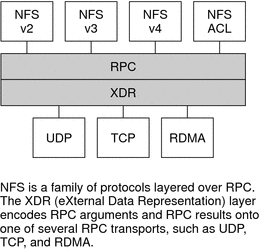| Previous | Next |
Part I Network Services Topics
Part II Accessing Network File Systems Topics
4. Managing Network File Systems (Overview)
5. Network File System Administration (Tasks)
6. Accessing Network File Systems (Reference)
Commands for Troubleshooting NFS Problems
8. Planning and Enabling SLP (Tasks)
10. Incorporating Legacy Services
Part V Serial Networking Topics
15. Solaris PPP 4.0 (Overview)
16. Planning for the PPP Link (Tasks)
17. Setting Up a Dial-up PPP Link (Tasks)
18. Setting Up a Leased-Line PPP Link (Tasks)
19. Setting Up PPP Authentication (Tasks)
20. Setting Up a PPPoE Tunnel (Tasks)
21. Fixing Common PPP Problems (Tasks)
22. Solaris PPP 4.0 (Reference)
23. Migrating From Asynchronous Solaris PPP to Solaris PPP 4.0 (Tasks)
25. Administering UUCP (Tasks)
Part VI Working With Remote Systems Topics
27. Working With Remote Systems (Overview)
28. Administering the FTP Server (Tasks)
29. Accessing Remote Systems (Tasks)
Part VII Monitoring Network Services Topics
NFS Over RDMA
Starting in the Solaris 10 release, the default transport for NFS is the Remote Direct Memory Access (RDMA) protocol, which is a technology for memory-to-memory transfer of data over high-speed networks. Specifically, RDMA provides remote data transfer directly to and from memory without CPU intervention. RDMA also provides direct data placement, which eliminates data copies and, therefore, further eliminates CPU intervention. Thus, RDMA relieves not only the host CPU, but also reduces contention for the host memory and I/O buses. To provide this capability, RDMA combines the interconnect I/O technology of InfiniBand on SPARC platforms with the Solaris operating system. The following figure shows the relationship of RDMA to other protocols, such as UDP and TCP.
Figure 6-1 Relationship of RDMA to Other Protocols

Because RDMA is the default transport protocol for NFS, no special share or mount options are required to use RDMA on a client or server. The existing automounter maps, vfstab and dfstab, work with the RDMA transport. NFS mounts over the RDMA transport occur transparently when InfiniBand connectivity exists on SPARC platforms between the client and the server. If the RDMA transport is not available on both the client and the server, the TCP transport is the initial fallback, followed by UDP if TCP is unavailable. Note, however, that if you use the proto=rdma mount option, NFS mounts are forced to use RDMA only.
To specify that TCP and UDP be used only, you can use the proto=tcp/udp mount option. This option disables RDMA on an NFS client. For more information about NFS mount options, see the mount_nfs(1M) man page and mount Command.
Note - RDMA for InfiniBand uses the IP addressing format and the IP lookup infrastructure to specify peers. However, because RDMA is a separate protocol stack, it does not fully implement all IP semantics. For example, RDMA does not use IP addressing to communicate with peers. Therefore, RDMA might bypass configurations for various security policies that are based on IP addresses. However, the NFS and RPC administrative policies, such as mount restrictions and secure RPC, are not bypassed.
| Previous | Next |